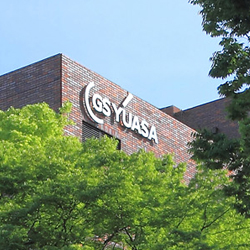Building Better Relationships with Local Communities
We seek to contribute to solutions to social issues through our business activities so that we can support the sound and sustainable development of local communities.
Contributions to Society
Contribution to the SDGs through Our Business Activities
The Sustainable Development Goals (SDGs) express priority global issues and the ideal status of global society in relation to economics, society, and the environment in the lead-up to 2030. Many countries, companies, and other organizations are actively addressing these issues with the aim of creating sustainable societies.
The GS Yuasa Group believes that it can contribute to achieving the society sought by the SDGs by practicing our corporate philosophy of contributing to people, society, and the global environment through innovation and growth of our employees and business entities. The Group is developing globally with storage batteries as its main products, and by providing products and services to regional societies in every country of the world by making use of the storage battery technologies we have accumulated through more than a century of experience, we are working to solve the shared problems of the international community. In addition, the Group has decided to consider CSR issues that have an impact on its business as well as a significant impact on society, as materiality. By promoting activities that respond to materiality, we aim to maximize the positive impact and minimize the negative impact on global social issues.
Refer here for information on our efforts to contribute to the SDGs with Group products and services.Refer here for information on the Group’s contribution to SDGs through its response to materiality.
Refer here for the Group’s materiality.
Contributions to R&D Relating to Space Development Applications
The Group’s space lithium-ion batteries are used on the International Space Station (ISS). The ISS is a manned test facility constructed approximately 400 km above the Earth’s surface. It is used through the cooperation of many countries.
The main objective of the ISS is scientific and technological advances through various experiments and research in outer space, and the results of research, experimentation, and measurement are contributing to enriching lifestyles and enhancing industrial competitiveness. It is a key facility for making significant advances in space development and is also a symbol of international cooperation and peace operated jointly through the provision of state-of-the-art technologies by numerous countries.*
Power for all equipment on the ISS including experimentation and observation devices and life support systems is supplied by photovoltaic power generation. However, power generation ceases 16 times each day as the ISS passes through the earth’s shadow, and during these periods, power is supplied by GS Yuasa lithium-ion batteries for space use that are charged while the station is in the sunlight.
The GS Yuasa Group will continue contributing to the development of science and technology for the realization of a sustainable society through development and manufacture of high-performance lithium-ion batteries.
Source: the Japan Aerospace Exploration Agency (JAXA)
Free Provision of Products to Local Communities
PT.GS Battery (below, PTGS) in Indonesia has continuously provided storage batteries to fire departments, regional communities, and local governments in Karawang Regency and Semarang Regency. In Indonesia, where natural disasters (such as earthquakes, tsunamis, and floods) are many, disaster management activities carried out by the Karawang fire brigades play a very important role. PTGS assist the fire brigades in their smooth operations through the continuous supply of storage batteries. In fiscal 2024, in addition to donations to other public institutions, PTGS provided 56 storage batteries free of charge.
Siam GS Battery (below, SGS), located in Thailand has donated our company manufactured storage batteries to the Thung Yai Naresuan Wildlife Sanctuary and Border Patrol in Kanchanaburi Province. The Thung Yai Naresuan Wildlife Sanctuary is one of Southeast Asia’s largest wildlife reserves endowed with untouched nature and is also a UNESCO World Heritage Site. The donated storage batteries are used in solar power generation systems providing support to daily power use.
The Group will contribute to sound and sustainable development of local communities by working together and coexisting with them through our product offerings.
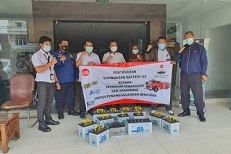
Donation of storage batteries to
fire brigades (PTGS)
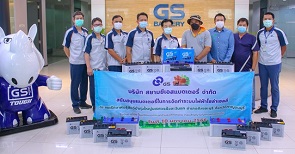
Donation of storage batteries to the wildlife
sanctuary (SGS)
Contributions to the Environment
Stable Supply of Photovoltaic Generation Systems
A photovoltaic generation system using the GS Yuasa Group's lithium-ion batteries has been in operation at the Kushiro Town Toritoushi Wildland Photovoltaic Generation Plant in Hokkaido.
When generating photovoltaic power, changes in natural conditions, such as sunshine hours and temperature, can lead to significant fluctuations in the power generated, while a major increase in the photovoltaic power load could reduce the quality of the system's power in terms of both voltage and frequency. For this reason, storage battery systems are necessary to stabilize output fluctuations in power generated when photovoltaic power generating facilities are connected to the power grid.
In conjunction with the global increase in energy demand due to the growing population, economic growth and other factors, there are increasing calls for the expanded use of renewable energy as an alternative to limited fossil fuels. The introduction of storage battery systems to stabilize output fluctuations is essential for the effective use of energy from photovoltaic or wind power generation.
The Group continues to promote the use of high-performance lithium-ion battery systems in power generation and is aiming to contribute to creating sustainable local communities using renewable energy.
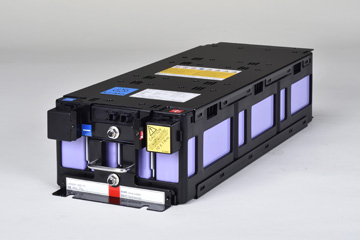
Industrial lithium-ion battery module LIM50EN series
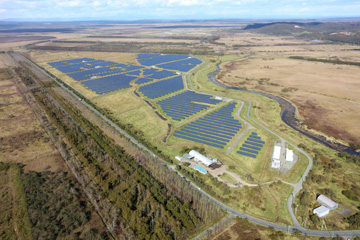
Overall view of Kushiro Toritoushi
Wildland Photovoltaic Generation Plant
Contributing to the Optimization of Energy Use
The Group aims to optimize energy use in local communities by utilizing new energy services that link storage batteries with IoT technology.
At the Kyoto Plant, we have introduced a power storage system manufactured by our company that can handle virtual power plants* (below, VPP) and that performs energy management taking into account the balance between power supply and demand. By adjusting the power supply balance in the plant during normal times and utilizing it for peak cut in the event of tight demand, we have been able to achieve stabilization of power supply and lower power consumption costs. In addition, in the event of an emergency such as a power outage due to a large-scale disaster, supplying power in cooperation with solar power generation systems to lighting load (lighting and outlet equipment) and power load (air conditioning equipment) has also played a role in ensuring employee safety and business continuity.
Since fiscal 2016, the Group has participated in the VPP construction verification project to start verification of the introduction and control of large storage batteries. In fiscal 2017, we introduced a container-type power storage system at our Kyoto Plant and are promoting verification for the practical application of power supply and demand adjustments based on directives from external, large storage battery servers.
It functions like a single power plant through the supervision and control of scattered energy sources (including small-scale solar power generation and storage batteries) using IoT devices, and plays the role of adjusting the power supply-demand balance (including leveling the power load, absorbing surplus power when excess renewable energy is supplied, power supply in the event of power shortage).
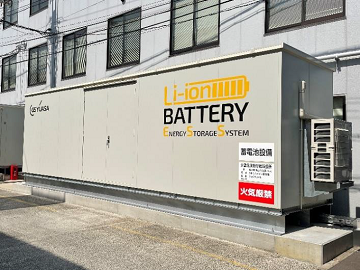
External appearance of the container type power storage system
Increasing the Accuracy of Greenhouse Gas Observations
The IBUKI-2 greenhouse gases observing satellite launched from the Tanegashima Space Center in October 2018 was equipped with a space lithium-ion battery manufactured by the Group. The mission of IBUKI-2 is to accurately and uniformly measure greenhouse gases such as carbon dioxide and methane around the world and to increase the precision of measurements.
Many countries are obligated to report on their own greenhouse gas emissions in accordance with the Paris Agreement, in international mechanism relating to climate change. As a result, the data obtained from IBUKI-2, which can take uniform measurements around the world, is expected to play an important role as a scientific basis for confirming the accuracy of greenhouse gas emissions volumes by each country.*
Group products will continue to contribute to international efforts to curtail global warming.
Source: the Japan Aerospace Exploration Agency (JAXA)
Support for Activities of the Yakushima Environmental and Cultural Foundation
GS Yuasa Battery Ltd. (GYB) is providing support for the Yakushima Environmental and Cultural Foundation as part of initiatives to preserve the environment in the region.
Yakushima, which was placed on the World Heritage List in 1993 for the first time in Japan, is representative of nature in Japan. The Foundation is involved in activities to protect the beautiful natural environment on Yakushima, a heritage for humanity, and the business for creating communities where nature and people can co-exist.
Furthermore, GYB offers a family tour to Yakushima as the prize to the Gold Award winner of the "GS Yuasa Eco Art Contest for Elementary School Students" which has been held from fiscal 2009, and also conducts activities for elementary school students to experience the beauty of nature.
The GS Yuasa Group is promoting contribution to the protection of nature on Yakushima which is called the "Island of Life" and environmental education for children through support for the Foundation.

Rich natural environment on Yakushima
(photo courtesy of the Yakushima Environmental and
Cultural Foundation, a public interest incorporated foundation)
Contributions to Human Resource Development
GS Yuasa Eco Art Contest for Elementary School Students
Since FY 2009, GS Yuasa Battery Ltd. has sponsored the GS Yuasa Eco Art Contest for Elementary School students to give the pupils, who will become the young citizens in the future, an opportunity to express their thoughts on the global environment.
Through this event, the Group provides children with an opportunity to share their thoughts and feelings on global environmental issues with society by a readily-available means. We will continue to hold this event in the future in order to enhance the creativity and self-expression capabilities of children and implement initiatives that respect the freedom of expression and the right of social participation of children.
Support for "Kokoro no Gekijo"
The GS Yuasa Group supports some performances (in Kyoto, Gunma, and Shizuoka prefectures) of "Kokoro no Gekijo" , sponsored by Performing Arts Centre Foundation and the Shiki Theatre Company. "Kokoro no Gekijo" uses the stage to communicate to children such important life lessons as the value of life, consideration of others, and the joy of trusting each other. Children across Japan are invited to the performances in school groups, free of charge. "Kokoro no Gekijo" activities are conducted and operated by boards of education, principles associations, and other bodies of individual local governments. As a sponsor, we participate in operational volunteer work (such as guiding children and reception).
Through our continued support of "Kokoro no Gekijo," we will continue to support activities that deliver valuable, unchanging lessons to children who will be leaders of the future.

"THE CAT WHO WISHED BE A MAN"
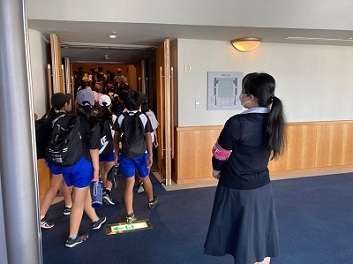
Volunteers assisting with the production
The files are in Adobe Acrobat Format. To view them you will need to download the Acrobat Reader.
Adobe Reader Download
